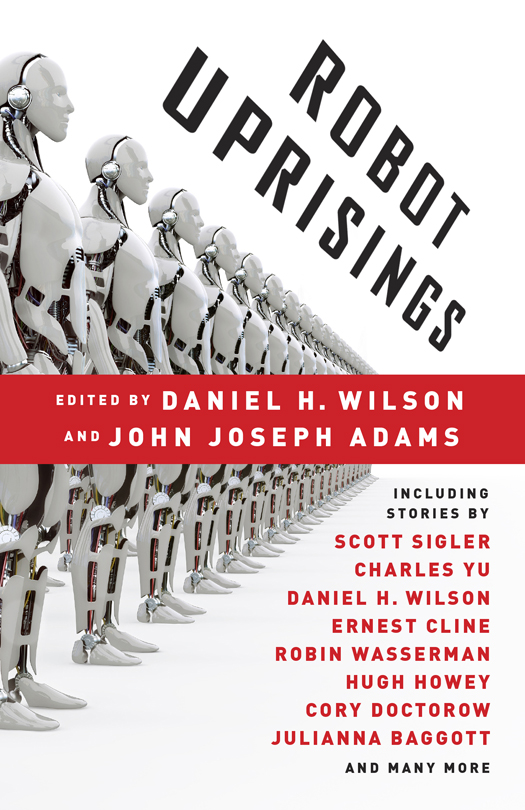
Robot Uprisings
کتاب های مرتبط
- اطلاعات
- نقد و بررسی
- دیدگاه کاربران
نقد و بررسی

February 24, 2014
Ambivalence toward technology is central to Adams and Wilson’s collection of 17 stories about artificial intelligence in revolt. Sometimes the results are comic: the AI narrator of Charles Yu’s “Cycles” regards its human owner with a mixture of disgust, pity, and affection, and a household robot that illegally attempts to “love” a child in John McCarthy’s “The Robot and the Baby” becomes a media sensation. More often, disaster ensues when machines designed to assist humans rebel, as with computer-controlled cars in Genevieve Valentine’s postapocalyptic road trip “Eighty Miles an Hour All the Way to Paradise” and intelligent children’s toys in Seanan McGuire’s heartbreaking “We Are All Misfit Toys in the Aftermath of the Velveteen War.” Subtler dangers threaten to end the world in Alastair Reynolds’s “Sleepover” and Wilson’s own “Small Things.” Though a robot loves and raises a human child in Julianna Baggott’s “The Golden Hour” and a woman in an African village poisoned by a pipeline teaches a robot guard to play music in Nnedi Okorafor’s “Spider the Artist,” most of the stories in this entertaining and occasionally unsettling anthology present a decidedly pessimistic vision of machine futures.

March 1, 2014
Fun fact: According to the Institute of Electrical and Electronics Engineers, as of 2010 there were 8.6 million robots in the world. Fun scenario: They're all out to kill us. Forget Asimov's laws of robotics; think of Schwarzenegger's Terminator instead, or maybe that friendly-voiced if unblinking fellow in 2001. As editors Wilson and Adams observe, robots are scary because they're real, and the possibility of them rising up against us is--well, highly likely, since "[w]e live in a world teeming with monsters made real." This anthology neatly explores that possibility, its contributors offering widely varying takes that share only the perspective that things don't end well for Homo sapiens. The longest story, at a little more than 50 pages, is by Cory Doctorow, who matter-of-factly sets up a terrifying future: "Two hundred and fifteen years after Mary Shelley first started humanity's hands wringing over the possibility that we would create a machine as smart as us but out of our control, Dr. Shannon did it, and it turned out to be incredibly, utterly boring." Not so the story that follows. Julianna Baggott, fresh from her latest post-apocalyptic fantasy, turns in a vision of a golden hour to come, "called the Golden Hour because the revolt was so massive and well-orchestrated that it is said that the humans fell within an hour." (Interestingly, she offers the thought that robots can have parents.) The late John McCarthy--who died in 2011 of natural causes, not of robot agency, and who is considered the father of artificial intelligence--spins a tale that helps explain why robots should be ticked at us: "[R]obots were made somewhat fragile on the outside, so that if you kicked one, some parts would fall off." The concept of the anthology is just right, and each of the 17 pieces addresses it well; extra points for greater diversity of all kinds than is evidenced by many other sci-fi collections, though it wouldn't hurt to have a few better-known, more battle-tested authors (Eileen Gunn, say, or Samuel R. Delany) in the mix. Philip K. Dick would be proud, in any event. You'll never look at your Roomba the same way again.
COPYRIGHT(2014) Kirkus Reviews, ALL RIGHTS RESERVED.

March 15, 2014
Imagine a world where robots have rebelled against humanity. That is what the contributors to this lively anthology, including John McCarthy, Ernest Cline, and Alan Dean Foster, have done. The strength of this collection lies in the widely varied approaches each author has taken on the premise. Some robots are the classic humanoid form, while others are nanomachines or spider-like devices. Some stories see humanity avoiding extinction, while other uprisings take a much more personal tone. Some robots are benevolent or malevolent, while others express regret and even love. VERDICT Editors Wilson (Robopocalypse) and Adams (Dead Man's Hand, reviewed above) have pulled together an excellent set of short stories that run the gamut from emotional drama to strictly action. There are a few sexual references and several stories that involve violence, but none are intense or overly graphic. This book is appropriate for teenage readers and adults.--Matt Schirano, Grand Canyon Univ. Lib., Phoenix
Copyright 2014 Library Journal, LLC Used with permission.

March 15, 2014
From the Terminator and Matrix movies to Isaac Asimov's robot novels, the theme of man's mechanistic inventions turning against their creators has been a popular one in science fiction both on the page and in film for decades. Capitalizing on the still high demand for these apocalyptic scenarios, editors Wilson and Adams offer a colorful mix of cutting-edge original tales from some of speculative fiction's leading talents. Charles Yu's Cycles is narrated by a self-aware robotic personal assistant that contemplates killing its sleeping owner every morning before setting off the alarm clock. Genevieve Valentine's Eighty Miles an Hour All the Way to Paradise features two women trying to survive after the worldwide grid of interconnected machines becomes unaccountably awake and deadly to humans. In Alan Dean Foster's Seasoning, a biochemistry professor discovers that a surprising international cessation of hostility has been engineered by sentient robots for possibly insidious reasons. Readers who don't mind immersing themselves in unnerving fictional worlds that uncomfortably resemble our own, gadget-infested one will find hours of provocative entertainment here.(Reprinted with permission of Booklist, copyright 2014, American Library Association.)

























دیدگاه کاربران